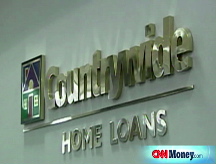Banks should fear a rate hike
The Fed left rates alone Wednesday. But with inflation fears brewing, an eventual rate hike could spell more trouble for embattled banks.

NEW YORK (CNNMoney.com) -- If the outlook for the banking industry worsens in the months ahead, the Federal Reserve may have something to do with it.
Members of the Fed's policy-setting committee, which left interest rates untouched Wednesday, left the door open to future rate hikes to curb inflation pressure.
Such a move may not happen until later this year or early 2009. But even a moderate increase in short-term interest rates by the Fed in the future could pose yet another headache for the struggling banking industry.
"It's never good - when the Fed raises rates - for the banking industry," said Anthony McSwieney, senior financial analyst at the rating agency A.M. Best.
When the Fed began its rate-cutting campaign last September, it was one of the few saving graces for banks, which were, at the time, in the early throes of the credit crunch.
The cuts led to a steepening of the yield curve, meaning that the difference between short-term rates and long-term rates widened.
That drove down short-term borrowing costs for banks and securities firms. At the same time, higher long-term rates boosted banks' net interest margins, the profits they make from taking in deposits and lending them back out.
All told, the nearly 8,500 domestic insured deposit institutions reported a 9.6% jump in net interest income, to nearly $95 billion, during the first quarter of this year from a year ago, according to the Federal Deposit Insurance Corp.'s quarterly banking report.
While their most recent quarterly results may not have reflected it because of credit-related writedowns, household banking names like Citigroup (C, Fortune 500), Bank of America (BAC, Fortune 500) or Wachovia (WB, Fortune 500) tended to be the biggest beneficiaries of the rate cuts, according to FDIC data.
Typically, these big banks are also more affected by rate hikes because they tend to rely more on so-called wholesale funding sources, such as the debt market, for capital. The debt market is highly sensitive to changes in interest rates.
But if the Fed were to shift to an inflation-fighting stance and start raising rates, smaller banks could be the ones who get stung the most.
Gerald Hanweck, a finance professor at George Mason University's School of Management, warns that smaller banks already grappling with exposure to bad mortgages could be in the deepest trouble.
"Some of these banks right now are barely profitable," said Hanweck. "They are right on the edge and [higher rates] could tip them into losses."
Rate hikes could also make an already tough lending environment even tougher. In previous years, banks could compensate for rising rates by relaxing their underwriting standards to increase loan volume or attract new borrowers.
Nowadays, however, heightened regulatory scrutiny and rising loan losses have prompted banks, both large and small, to tighten their underwriting standards. And consumers aren't doing a lot of borrowing nowadays even with rates as low as they are.
But banks' interest rate pain wouldn't end there.
Rising interest rates would also lead to even more intense competition for deposits, notes Michael Nix, a principal at Greenwood Capital Associates in Greenwood, S.C., which oversees about $750 million in assets.
Many online banks and brokerages have been offering their own interest bearing money market accounts, often at a higher rate than traditional banks, in recent years.
To be sure, a rate increase would not affect every bank in an identical way, notes Khanh Vuong, a vice president at A.M. Best who oversees the bank rating group. In fact, he said the impact of rising rates could "vary from region to region and bank to bank."
Banks with well-positioned balance sheets would be able to weather a rising rate environment, he noted. And financial institutions that aren't as threatened by fierce competition for deposits would also be able to withstand rate pressure.
But for an industry that's already dealing with a host of problems, the possibility of rate hikes down the road is not an encouraging sign. ![]()



